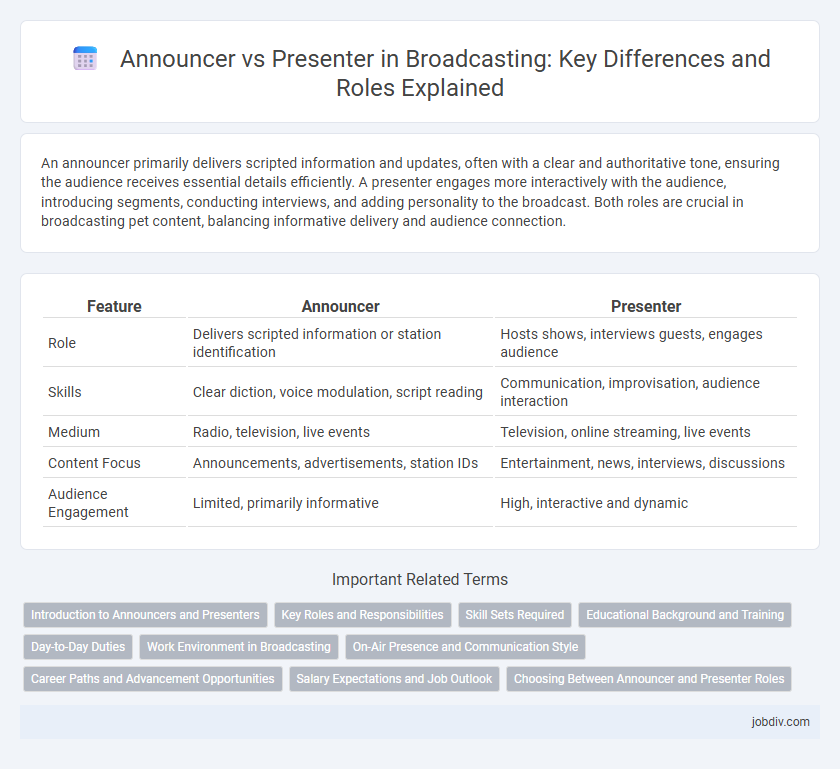An announcer primarily delivers scripted information and updates, often with a clear and authoritative tone, ensuring the audience receives essential details efficiently. A presenter engages more interactively with the audience, introducing segments, conducting interviews, and adding personality to the broadcast. Both roles are crucial in broadcasting pet content, balancing informative delivery and audience connection.
Table of Comparison
| Feature | Announcer | Presenter |
|---|---|---|
| Role | Delivers scripted information or station identification | Hosts shows, interviews guests, engages audience |
| Skills | Clear diction, voice modulation, script reading | Communication, improvisation, audience interaction |
| Medium | Radio, television, live events | Television, online streaming, live events |
| Content Focus | Announcements, advertisements, station IDs | Entertainment, news, interviews, discussions |
| Audience Engagement | Limited, primarily informative | High, interactive and dynamic |
Introduction to Announcers and Presenters
Announcers and presenters play distinct roles in broadcasting, with announcers typically delivering scripted voice-overs, station IDs, and live event commentaries, while presenters engage audiences by hosting shows and conducting interviews. Announcers often specialize in clear articulation and voice modulation to convey information effectively, whereas presenters emphasize on-screen presence and audience interaction to maintain viewer interest. Both roles are crucial in creating seamless broadcast experiences across radio, television, and online media platforms.
Key Roles and Responsibilities
Announcers primarily deliver scripted content such as news, advertisements, and station identification, focusing on clear articulation and timing to maintain broadcast flow. Presenters engage with audiences more interactively, hosting shows, conducting interviews, and facilitating discussions to create engaging and dynamic content. Both roles require strong communication skills, but announcers emphasize precise delivery while presenters prioritize audience connection and content management.
Skill Sets Required
Announcers require strong vocal clarity, precise diction, and the ability to maintain a consistent tone suitable for live or recorded broadcasts. Presenters need exceptional communication skills, charisma, and the ability to engage with an audience while managing interviews, transitions, and scripted or unscripted content. Both roles demand quick thinking, adaptability, and a deep understanding of content to effectively convey information to viewers or listeners.
Educational Background and Training
Announcers typically possess formal education in communication, journalism, or broadcasting, often complemented by voice training and pronunciation coaching to ensure clear articulation. Presenters usually have academic backgrounds tailored to their specific subject matter, such as science or sports, combined with media training to effectively engage diverse audiences. Both roles rely on practical experience through internships or workshops to master live delivery and audience interaction skills.
Day-to-Day Duties
Announcers primarily focus on delivering scripted content such as news, weather updates, or sports commentary with precise timing and clear diction. Presenters engage more interactively with the audience, often hosting live segments, interviews, or discussions, requiring adaptability and spontaneous communication skills. Both roles involve research and preparation, but presenters typically have a broader scope of content management and audience engagement during day-to-day broadcasting.
Work Environment in Broadcasting
Announcers typically work in radio studios or newsroom booths, focusing on delivering scripted content with a clear, authoritative voice. Presenters often operate in television studios or live event settings, engaging directly with the audience through unscripted interaction and dynamic expression. Both roles require collaboration with production teams, but announcers emphasize voice clarity while presenters prioritize on-screen presence and audience connection.
On-Air Presence and Communication Style
Announcers maintain a formal, authoritative on-air presence, delivering scripted content with precise diction and measured tone to ensure clarity and professionalism. Presenters adopt a conversational, engaging communication style, fostering a connection with the audience through spontaneity and relatable language. Both roles require strong vocal skills, but announcers emphasize structure and consistency, while presenters prioritize approachability and audience interaction.
Career Paths and Advancement Opportunities
Announcers typically begin their careers with roles in radio or local TV, focusing on voice clarity and script delivery, which can lead to specialized positions in news or sports broadcasting. Presenters often start by hosting varied programs, gaining skills in live interaction and audience engagement, making them suited for broader roles including show hosting and event anchoring. Career advancement for both involves building a strong on-air presence, networking within media, and adapting to digital platforms where multimedia content creation is increasingly valued.
Salary Expectations and Job Outlook
Announcers typically earn an average salary ranging from $30,000 to $70,000 annually, depending on market size and experience, while presenters often command higher pay, especially in prime-time or specialized broadcasts, with salaries reaching upwards of $100,000. Job outlook for announcers is relatively stable but faces competition due to digital media growth, whereas presenters with versatile skills in multimedia platforms experience stronger demand and better career advancement opportunities. Both roles require strong communication skills, yet presenters often benefit from broader visibility and brand-building potential, positively impacting earning potential and job security.
Choosing Between Announcer and Presenter Roles
Choosing between announcer and presenter roles depends on the specific broadcasting format and audience engagement style. Announcers primarily deliver scripted information, maintaining a formal tone ideal for news and sports, while presenters engage with viewers more casually, suitable for talk shows and entertainment. Consider skill sets such as voice modulation, improvisation, and audience interaction when deciding the best role for a broadcasting career.
Announcer vs Presenter Infographic

 jobdiv.com
jobdiv.com